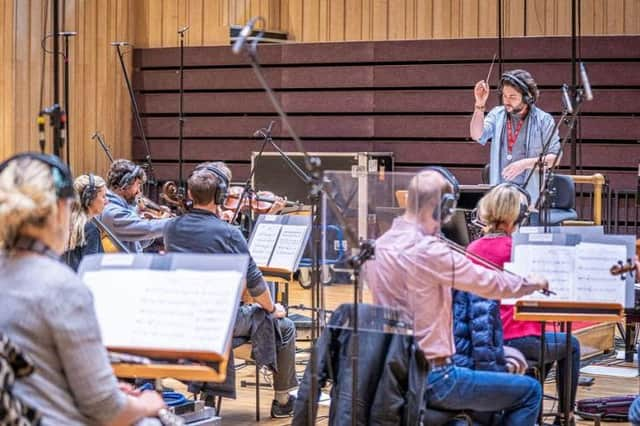The RSNO: Coming Soon to a Movie Soundtrack Near You


Why has it taken so long for one of Scotland’s symphony orchestras to realise there’s big money to be made, and kudos to be gained, from setting up a custom-built facility to record soundtracks, thereby tapping into the global network that services and supplies the film and video games industry? The reasons vary, but as often happens, the fact that one exists now is down to one person’s vision and determination.
The RSNO’s chief executive, Alistair Mackie has been banging on about this privately since he took up office in 2019. And last month, at a musical launch in the RSNO’s new auditorium adjoining Glasgow Royal Concert Hall, now additionally fitted out with state-of-the-art control room as part of an overall half-million pound investment, and featuring a “canned-up” RSNO newly-versed in the ways of studio technique and etiquette, Mackie’s promise – named Scotland’s Studio – became a reality.
Advertisement
Hide AdAdvertisement
Hide AdWhen it comes to the recording industry, Mackie knows what he’s talking about. Formerly lead trumpeter with London’s Philharmonia Orchestra, a large part of his professional life was spent in session work at either Abbey Road or Air Studios, up until now the only two spaces in the UK capable of servicing such film industry requirements. But these facilities are usually booked out years in advance. He spotted a golden opportunity.
“London has a phenomenal pool of musicians from all its orchestras and freelance community to meet the demands of the studios,” he says, “but so does Scotland. I don’t see why that same commercial music ecosystem can’t develop here if you have a facility to host them. At the RSNO, part of our DNA is now in engaging with new technologies, new platforms, and I see film music as very much a part of that story.”
The first fruits of the initiative will be seen on the new Sky Max channel this Christmas in a remake of the 1972 yuletide ghost story The Amazing Mr Blundell, featuring Tamsin Greig and Simon Callow. A new score, written and conducted by the LA-based Scots film composer Blair Mowat, was recorded recently by the RSNO, replacing the original music by Elmer Bernstein.
Mackie’s belief is that the RSNO’s new facility will ensure more of this work stays in the UK rather than going to Vienna or Bratislava, currently the main alternatives to London, and where the musicians are a significantly cheaper alternative to those based here.
On balance, though, he believes Scotland has a competitive edge. “I think British musicians are renowned for the quality of what they do,” he says. “They do it faster, they do it better. On that basis, our musicians will get paid the same as London musicians. We’re not going to compromise on that.”
As for those East European studios, he’s not interested in competing solely on price. “I don’t think that’s good for the image of the RSNO; I don’t think it’s good for the wider musical scene if we fundamentally lower the rates for film music. So we will not pay less than what London musicians get, but we can be more competitive than London because we own the studio. Abbey Rd and Air Studios, with lengthy lead-in times, are going up and up in cost. That’s our pitch to the market.”
The new nerve centre has been named the Iain and Pamela Sinclair Control Room after its generous donors. To operate it, Mackie has had to recruit an in-house sound engineer, Hedd Morfett-Jones, from England. But he wants to see more home-grown skills development. “I don’t want to keep paying London engineers to come up, but at the moment they just don’t exist here,” he says.
Advertisement
Hide AdAdvertisement
Hide AdAnd let’s not forget the benefit of all this to the RSNO’s coffers. Times are hard for the whole creative industry, so a likely money-spinner is not to be sniffed at.
“All the time we’re struggling with standstill funding,” says Mackie. “I don’t see ticket income growing in Scotland, and I can’t see government grants growing in Scotland. We simply need a new income stream if we’re going to keep going as an organisation. I am quite taken with the idea of Hollywood subsidising concerts at the Royal Concert Hall.”
For more on the RSNO, see www.rsno.org.uk
A message from the Editor:
Thank you for reading this article. We're more reliant on your support than ever as the shift in consumer habits brought about by coronavirus impacts our advertisers.
If you haven't already, please consider supporting our trusted, fact-checked journalism by taking out a digital subscription at https://www.scotsman.com/subscriptions